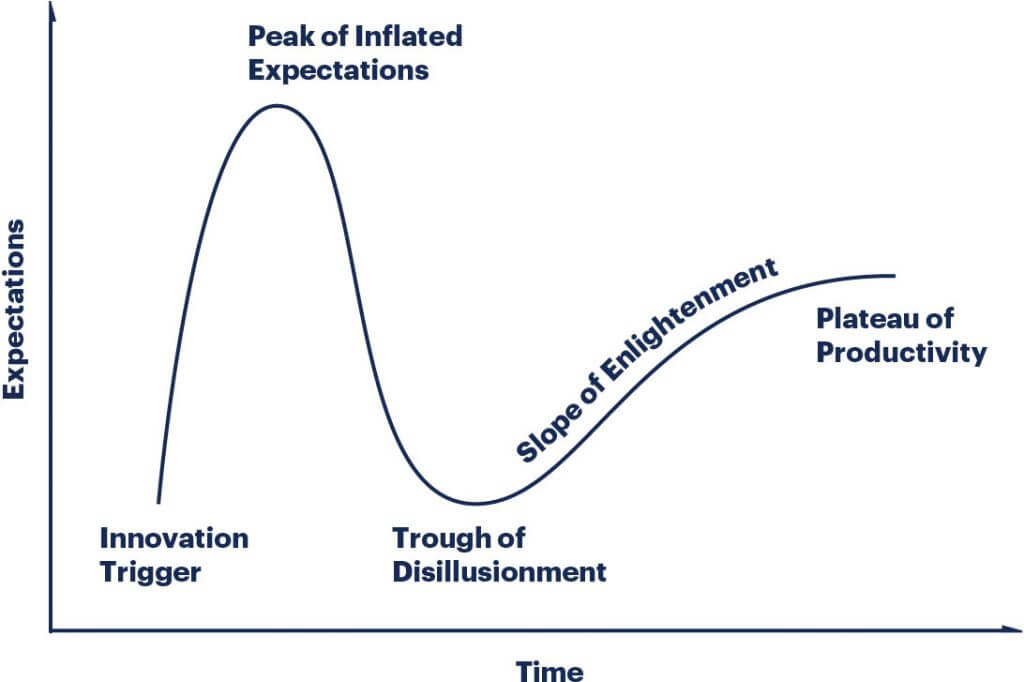With the lastest news of AI layoffs, I’m struggling to understand how the idea of a career still holds. If careers themselves effectively become gambles like lottery tickets, how do we maintain drive and hopes in the longterm endgame of our struggles?
I know AI as an honest utility is itself a lie to some extent, but this only aids my argument further. People’s career struggles are panning out to be valueless because of a nothing-fad that no one could have predicted.
Job security became a myth long before AI.
The only person who won’t fire you is you.
Someone’s never had a depressive episode.
You are very wrong about that, but I still never fired me. 🤷♂️
UPDATE: Downvoted for admitting that I, too, have battled severe clinical depression. Well done.
I want to know who goes around giving a single downvote to entirely personal and uncontroversial comments. Happens to almost every single one of my comments. I’d rather have five or ten downvotes than just one. I dunno, I know I shouldn’t let it bother me, but it does.
Let it bother you, then don’t let it ruin your day. People are delightful and strange. 🤷♂️
Some jobs will be very difficult to replace with AI. People who can do so will try to flock to those. Personally, I think the only peaceful way forward will require UBI. Without that, sharpen the guillotines.
UBI?
Universal Basic Income
University of Boise Idaho
Urinary Balls Infection.
That’s the company that made those assassin games
Urethra Bottle Insertion
Uncle Bob’s Income
Only a matter of time before the economy collapses because all these companies replace their workers with AI, only to find that no one can buy their services because everyone is out of a job.
I can’t predict the future but that very much sounds like something our overlords would do.
I can totally see it happening because these companies are so dead set on cutting costs that they’re not seeing the bigger picture.
‘Job security’ has been a myth for more than half a century. A career for mostnpeople is nothing more than a job that you’re enmeshed in, and can’t easily leave if you want to.
It is a myth period with exception of state employment and brief period in history in some developed countries after ww2
I think I’d disagree with this.
For a while, there was a sense among the robber baron class that loyalty to employees would pay off with loyalty returned. Consider industrialists building towns for their employees and families, complete with schools and arenas.
Regardless of how cynical the reasoning may have been, the result was a degree of mutual loyalty and job security.
I don’t agree. It takes effort and you will need to balance tradeoffs but employment for life with one employer is possible.
You write as if you had any job security in the pre-AI era…
Children… Every generation they need to learn the hard time that this is how it always has been!
I don’t blame them, but you would think their parents who went throught this would try to educate their own kids. But most either too stupid to figure it out or too naive or just plain old bootlickes…
So here we are, generation in, generation out slaving to make somebody else wealthy.
What is life but a lottery?
A lot of the drive towards AI is people thinking to save a quick buck, but longer term that places them in a very unsteady position themselves.
All products end up being for “shareholder value”, and AI will be no different. Someone will find an enshittification vector and run with it.
Suddenly, that “quick buck” becomes a monthly subscription that costs more than the people fired. Company data is harvested and sold, customers are advertised out, the shittiness of the system becomes a company problem.
So we’re either going to see a stark change away from the current shareholder value model (about as likely as world peace), or we’re going to see a lot of CEO seppuku. Win win really.
I think google’s recent AI strokes, like them advising you to jump of a bridge, are a great example of companies panicking to innovate, to not be left behind. In the meantime they forget to check their implementations, their products and their quality. They’ll slowly dwindle, transform inyo something unrecognizable, but all through their downfall, they’ll continue making money for the shareholders.
A.I. is likely going to change the world as much as the printing press (at the very least, and possibly as much as the industrial revolution). I wouldn’t call it a nothing fad. It is definitely shaking up my career (video production) already. And at least from my point of view, becoming a creative generalist is the best way to adapt. Work is going to become more about knowing a little to moderate amount about a whole lot of things, so that you can effectively orchestrate a hierarchy of AI agents. Deep specialization increasingly carries too much risk, and the A.I. are much better at some aspects of it than we typically are.
Finally time for my adhd to shine, I can do so many things but suck at all of em
That’s the exact opposite of what everyone has been told for decades now, so it’s definitely going to take some adjustment.
I think UBI will become a lot more plausible in the future.
That said, as a macro approach to the problem of job security and AI taking jobs, I see serious potential in worker co-ops which own the equipment and processes. As in the past, the problem isn’t that technology is making something more efficient. The problem is a small subset of people benefiting from the technology while others struggle. If we own the business and democratically control decision making then we all can benefit. (And going beyond protecting our jobs we create more long term security and power)
The problem of course is how we get there from here. For myself, my current plan is to grind enough until I’m in a position to start a co-op (or join an existing one) and then focus on growth, bringing more people onboard, and expanding the benefits that the co-op can bring its members.
I value small co-ops like local grocery stores, that said to really move the dial in creating the world we want to see, I think we need to get big, and to be competitive in terms of product as well as pay compared to non-democratic major players. One co-op I’m excited about is Obran, which is a conglomerate that converts private owned businesses to co-ops. I’m also excited about platform co-ops like the drivers cooperative and Artisans cooperative.
Saying AI is a nothing fad makes you sound like a boomer in the late 90’s and early 00’s talking about the internet. It is definitely not a fad. It will affect 80% of all jobs on the planet over the next 10 years.
Is it possible that I miss out on valuable insights by immediately dismissing the opinions of anyone who refers to machine learning as AI?
Sure.
Will I stop doing it?
Sure as hell not.
Indeed. Though that’s only my surface level complaint.
On a deeper level; LLMs just fuckin’ suck ass. They aren’t people, stop assuming they can do things that people can do.
I don’t think they suck ass as long as you understand their limitations, but everyone seems to expect them to be able to fully replace human thought and uh, yeah they’re pretty bad if that’s your goal.
You’ll be dismissing the vast majority of experts in the fields. The only people who refuse to call it AI are those who think AI refers to the stuff you see in sci-fi movies. The ones doing the work and who actually know what they’re talking about use AI to mean even the simplest thing like a bunch of if statements that make up a hard-coded decisions tree.
Artificial intelligence. There’s nothing intelligent going on in an LLM model. There’s learning, but not intelligence.
The people objecting to the use of the term AI to describe computerized parrots are the people who think intelligence still matters as a concept.
Right, so if that’s the discussion you care about, that’s totally fair. Most researchers I know couldn’t give a rat’s ass what you call it as long as there’s something to call it. I think we’ve all long accepted that no two person will have the same idea of what intelligence means.
Many of those boomers retired comfortably without ever learning the slightest bit of computer literacy. Even now, plenty of jobs require little-to-none.
Furthermore, we are in the “dotcom bubble” stage of “AI”. The people least knowledgeable about it are the ones throwing billions of dollars at whoever claims to “use AI” for literally anything. We are on, (or maybe for those of us who are paying attention, right after), the Peak of Inflated Expectations.

Remember when 5-ish years ago all anyone would talk about in the tech space is how being a truck driver would be an obsolete job in the near future? I remember.
I do hope we hit the trough of disillusionment and stay there for a good long while, because we don’t have any safety nets in place for the billions of people who will be impacted, but who knows. Business owners certainly don’t give a fuck.
There are certain careers that can’t be replaced by AI - anything that requires working with your hands will not be replaced by AI unless robots suddenly get invented. But if robots exist, then there’s likely bigger things to worry about than your job.
I would look for non-routine jobs that require a lot of handiwork. Non-routine because it will be hard to replace with general, non-AI automation, and handiwork because AI is currently digital only.
Carpentry, plumbing, engineering, laboratory research, teaching all likely fall into the safe category
It turns out gen AI is good at training virtual robots, which can then be embodied in robots like this guy. There’s a $16,000 Chinese version of that robot that’s a bit smaller. There’s a robot dog that GPT4 trained to balance on a beach ball, and the NVIDIA pen twirling training. I guess what I’m saying is… robots exist.
See what Hackworth said about the robots, also, there are multiple ongoing projects that hope to change the existing construction processes enough that android-style robots won’t be necessary. 3d printing houses, for example.
The jobs that will be safe longest are those that are both physical and unpredictable/non-standardizable.
multiple ongoing projects that hope to change the existing construction processes enough that android-style robots won’t be necessary. 3d printing houses, for example.
Never going to happen in the US or Canada. Oh sure the rest of the world will but not those two countries. The culture of construction work can’t adapt. It’s amazing to me when I see stuff go up in South East Asia vs the US/Canada.
South East Asia: standardized parts, 3 shifts, army of workers, about half of which are women, things just move.
US/Canada: custom everything nothing connects right, 1 shift, all large white males, things take forever.
The best reason to try is not based on the chance of success.
The best reason to try is that it hurts less than doing nothing.
When you’re active, life hurts less. This is the most rational reason I have found, in my 40 years of searching, for getting out of bed in the morning.
Finding motivation is a hard problem for me. The most consistent source I’ve found is the understanding that giving up does not bring relief. It brings hell.
How do you avoid the feeling of superficiality? That’s what I struggle with most. It just doesn’t really seem to matter.
I lower my sights. My plan has been to orient myself to the highest good I can conceive of. For years, for me, that was “Help humanity survive WW3”.
But then I realized the practice is different. The highest good that I can conceive of is actually much lower, and it’s like “I have $5k buffer and am developing friendships with my neighbors”.
I realized that if I couldn’t visualize the scenario, concretely, then it was beyond “the highest good I can conceive of”.
So when I lower my sights to something my imagination can actually see, it’s at least meaningful enough to get me moving. It’s like the gravitational field strength equation: a smaller mass can have more gravitational effect just by being closer. That’s why we fall toward Earth and not toward the Sun, which is far bigger. Earth’s gravity is dominant because it’s close.
For me, the stuff I can visualize is closer than the stuff I can just say.
Also, the feeling of superficiality hurts less than the feeling of having given up. So even if I keep moving and it feels fake, that still hurts less than sitting there having given up.
This resonates well with me. However, still struggling with the last sentence. I can’t ignore how superficial life has become for me. A therapist told me to consider my value for simply existing. There are days when I’m able to do that, but many in which nihilism takes over.
Stop doom scrolling for one.
Apathy is death
This is going to be a fucking painful transition - I daresay its going to be one of the most painful transitions in history… but the solution is social upheaval. I can’t tell you when it will fire but I doubt we’ll ever see 20% unemployment in developed countries so probably sometime when we’re in the mid-teens. It’s unlikely we’re going to see a voluntary solution to wealth inequality so shit will get violent and it’ll suck for everyone.
The AI revolution will take a while to come to fruition and it will require a lot of oversight initially, but we’ll gradually scale back the oversight and concentrate a few areas of the economy into extremely few hands (sort of like what’s happened with tech giants)… eventually we’ll hit the breaking point and hopefully we’ll come out the far side with an equitable post-scarcity economy. If you’re lucky you’ll be dead by then though because it’s going to fucking suck but, inevitably, either the wealthy will lose or we’ll go extinct.
I think in the next time it’s mostly the unskilled and office jobs. I think we still have a shortage of skilled IT professionals and people who can do more than webdevelopment and write simple python scripts. And we also have a shortage of teachers, kindergarden teachers, people who care for the elderly, doctors, psychologists. And despite AI creeping into all the fields, I still see a career there for quite some time to come. Also I don’t see an AI plumber anytime soon coming around and fixing your toilet. So I’d say handyman is a pretty safe bet.
But I’d say all the people making career decisions right now better factor that in. Joining a call center is probably not a sustainable decision any more. And some simple office or management jobs will become redundant soon. I just think big tech laying off IT professionals is more an artificially inflated bubble bursting, than AI being now able to code complex programs or do the job of an engineer.
It’s not really a gamble. We know what AI can do. And there are lists with predictions which jobs can be automated. We can base our decisions on that and I’ve seen articles in the newspapers 10 years ago. They’re not 100% accurate but a rough guide… For example we still have a shortage of train operators. And 10 years ago people said driving trains on rails is easy to automate and we shouldn’t strive for that career anymore.
It’ll likely get there. But by that time society will have changed substantially. We can watch Star Trek if we’re talking about a post-scarcity future and all the hard work is done for us. We’d need universal income for that. Or we end up in a dystopia. But I think that’s to uncertain to base decisions on.
In my field, I’ve seen how computers have changed work and I expect AI to just be a continuation of it. The people who generally get replaced are the skilled labor and the unskilled professionals. I expect that trend will continue as AI gets integrated into the field. Even then, there is still going to be a lot of work regarding verification.
You need people who actually know what is going on, and you need people to replace them when they get too old or senile. Because AI is being shoved everywhere, but it is basically a VC scam. Turn yourself into the solution to that one problem that AI can’t solve.
I predict that “career” as we know it today will disappear shortly. We will have to change careers every 5 to 10 years. Depending on where the wind is blowing from and if there will be any vacant jobs. Being an expert in a field will not have much of a value as that expertise will be stolen by AI during one’s employment anyway. What can be helpful in this dystopia waiting for us would be analytic problem solving skills, creativity, constant learning and curiosity. But no matter what, we will all end up with minimum wage.











